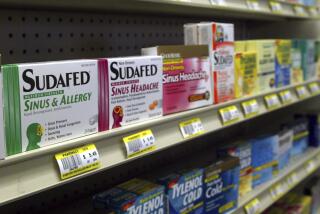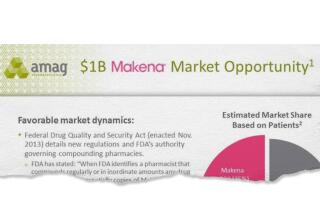Anesthetic Linked to Five Deaths Is Pulled
WASHINGTON — A recently approved anesthesia drug is being withdrawn because of the suspicious deaths of five patients and voluntary reports of other serious side effects.
The drug, Raplon, becomes the 11th prescription medicine to be pulled from the United States market for safety reasons since fall 1997. The volume of drug withdrawals in this 3 1/2-year span outpaces by far such safety actions taken in any comparable period.
The Food and Drug Administration granted the first approval by any nation for Raplon in August 1999. The manufacturer, Organon Inc., a New Jersey subsidiary of Netherlands-based Akzo Nobel, said it has decided voluntarily to withdraw the drug after reviewing occurrences of bronchospasm, an abnormal contraction of the smooth muscle of the bronchi that can severely impede a person’s ability to breathe.
Raplon was injected as a muscle relaxant for surgeries and for the placement of breathing tubes. When Raplon was approved, Organon touted the drug’s “favorable side-effect profile.”
However, bronchospasm was identified as a side effect of Raplon before it was approved by the FDA. The drug’s labeling states that, of 1,956 patients given Raplon in clinical studies, 3.2% experienced bronchospasm. Of 713 patients given comparative drugs, 1.8% were observed with bronchospasm, according to the labeling.
“This raises once again the concern that FDA is not paying adequate attention to pre-approval testing,” said Dr. Peter Lurie, deputy director of Public Citizen’s Health Research Group, an advocacy organization.
FDA Sought Further Study on Side Effects
At the FDA, officials declined to make available for comment any of the physicians who were responsible for evaluating or approving Raplon. The drug was approved following a 14-month review by the agency’s division of anesthetic, critical care and addiction drug products.
According to the labeling, the cases of bronchospasm among Raplon patients in clinical studies were “possibly related” to the release of histamine, a compound found in all cells of the body. In signing the approval of Raplon, a senior FDA official, Dr. John K. Jenkins, called upon Organon to design and complete by August 2001 a study of at least 300 patients to evaluate “particularly histamine effects.” Organon spokeswoman Frances De Sena said she was unfamiliar with the proposed study.
The first reported death of a Raplon patient who suffered bronchospasm occurred Feb. 18, 2000, according to documents filed with the FDA. The patient was a 25-year-old man.
De Sena said that, while bronchospasm was identified as a side effect before Raplon’s approval, none of the patients affected in the clinical studies died. As for the five deaths reported voluntarily since Raplon came on the U.S. market, De Sena said various factors prevented the company from concluding that Raplon caused the events.
Organon’s medical director, Dr. Deborah Shapse, elaborated in a letter dated March 27 that was addressed to anesthesiologists and hospital pharmacists:
“We have now received reports of several serious adverse bronchospasm events including a few unexplained fatalities. In each of these cases, the cause is unknown, as there were multiple drugs administered and other conditions present.”
10 Other Drugs Have Been Pulled
Shapse acknowledged that the deaths were reported voluntarily “and the exact frequency cannot be determined.” She added, “We feel a strong responsibility to the clinicians that not only use our products but also entrust the lives of their patients on the reliability of these products.”
The company is now pulling its applications seeking approvals to market Raplon in European countries, De Sena said.
In addition to Raplon, the other prescription drugs withdrawn since September 1997 were the diet pills Redux and Pondimin; the allergy pills Hismanal and Seldane; the painkiller Duract; the blood-pressure pill Posicor; the antibiotic Raxar; the diabetes pill Rezulin; the nighttime heartburn pill Propulsid; and Lotronex, a pill for irritable bowel syndrome.
Except for Seldane, Hismanal and Pondimin, all of those drugs were approved by the FDA since 1993, during an era when the agency has taken a more lenient approach toward the $100-billion pharmaceutical industry.
The Times reported in December that the FDA approved Redux, Duract, Posicor, Raxar, Rezulin, Propulsid and Lotronex while disregarding danger signs or blunt warnings from its own specialists. According to reports of adverse events filed with the FDA, those seven drugs were cited as suspects in 1,002 deaths.







